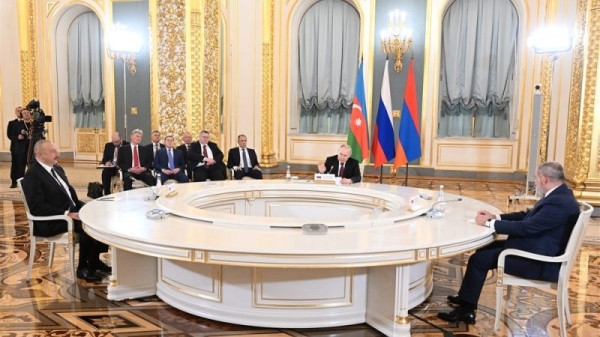Armenia, Azerbaijan optimistic at Putin-mediated talks

Arch foes Armenia and Azerbaijan are advancing towards normalising ties following mutual recognition of territorial integrity, the two countries’ leaders said Thursday (25 May) as they held talks in Moscow.
Armenian Prime Minister Nikol Pashinyan and Azerbaijani President Ilham Aliyev met separately with Russian leader Vladimir Putin before the three held joint negotiations late on Thursday.
The talks were held following recent deadly border clashes between the two Caucasus neighbours, which have been locked in a decades-long conflict for control of Azerbaijan’s predominantly Armenian-populated region of Nagorno-Karabakh.
“There is a possibility of coming to a peace agreement, considering that Armenia has formally recognised Karabakh as part of Azerbaijan,” Aliyev said ahead of talks.
Pashinyan was quoted on Monday saying that his country is ready to recognise Nagorno-Karabakh as part of Azerbaijan if Baku guarantees the security of its ethnic Armenian population,

Armenia’s Pashinyan gives up Karabakh, abandons Russia-led CSTO
Armenia’s Prime Minister Nikol Pashinyan was quoted on Monday (22 May) indicating sweeping changes in his country’s policy vis-à-vis its arch-foe Azerbaijan and its ally Russia.
“Azerbaijan has no territorial claims to Armenia,” Aliyev added.
Pashinyan said the two countries were “making good progress in normalising relationships, based on mutual recognition of territorial integrity.”
He said Yerevan was ready “to unblock all the transport links in the region that pass through Armenian territory”.
Putin said that “despite all the difficulties and problems that still remain, the situation is developing towards the settlement” of the Karabakh conflict.
He said the three countries’ vice prime ministers will meet in a week’s time in Moscow “to resolve the remaining issues,” regarding the reopening of transport links between Azerbaijan and Armenia.
Western engagement
The Caucasus neighbours have been seeking to negotiate a peace agreement with the help of the European Union and United States.
On 14 May, they agreed at a meeting hosted in Brussels by the European Council President Charles Michel on mutual recognition of territorial integrity.

EU hails progress after Armenia, Azerbaijan leaders meet
European Council President Charles Michel spoke of progress in talks between the leaders of Armenia and Azerbaijan in Brussels on Sunday (14 May), adding that “momentum should be maintained” towards a final peace deal.
But the West’s diplomatic engagement in the Caucasus has irked Moscow, the traditional power broker in the region.
Armenia and Azerbaijan fought two wars — in 2020 and in the 1990s — for control of Nagorno-Karabakh.
Six weeks of hostilities in autumn 2020 ended with a Russia-brokered ceasefire that saw Armenia cede swathes of territory it had controlled for decades.
Armenia, which has relied on Russia for military and economic support since the collapse of the Soviet Union in 1991, has accused Moscow of failing to fulfil its peacekeeping role in Karabakh.
Yerevan’s concerns have grown after Azerbaijani activists blocked in December Karabakh’s only land link to Armenia. In April, Azerbaijan set up a checkpoint manned by border guards along the route.
Last year, Yerevan also accused Azerbaijan of occupying a pocket of its land, in what it has said amounted to military aggression and demanded military help from Russia, which has never materialised.
With Russia bogged down in Ukraine and unwilling to strain ties with Azerbaijan’s key ally Turkey, the United States and European Union have sought to repair ties between the Caucasus rivals.
When the Soviet Union collapsed in 1991, ethnic Armenian separatists in Karabakh broke away from Azerbaijan. The ensuing conflict claimed some 30,000 lives.
Read more with EURACTIV




